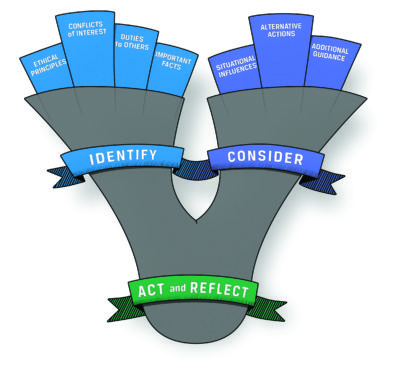Ethics in Practice: Conflict of Interest or Not? Case for Week of 16 April & Analysis
Did you correctly identify which CFA Institute Standard of Professional Conduct was potentially involved in this week’s case (16 April)? Check out the analysis below.
If you are happy with your investment manager, you would naturally recommend them if someone asks. So, does it matter that the adviser is related to you? Think about the scenario in this week’s case, and then join the conversation to discuss what you think about the choices made and which CFA Institute Standard of Professional Conduct may be involved.
Case
Joyce works as a research analyst at private equity firm. Her personal investments are managed by her brother Neville, who works as a financial adviser. One day over lunch, Joyce’s colleague, Roger, mentions to Joyce that he is looking for a financial adviser and asks Joyce who she uses to manage her investments. Joyce tells Roger that Neville is her investment adviser, but she does not disclose that Neville is her brother. After meeting with Neville, Roger hires him to manage his considerable assets. Neville regularly pays a €5,000 referral fee to his current clients who recommend new clients to his firm. Neville offers to pay his sister the €5,000 referral fee. Joyce was unaware of the potential referral fee and refuses to accept the money from her brother given their relationship. Did either Joyce or Neville violate the CFA Institute Standards of Professional Conduct?
- Neither Joyce or Neville violated the CFA Institute Standards of Professional Conduct.
- Only Joyce violated the CFA Institute Standards of Professional Conduct.
- Only Neville violated the CFA Institute Standards of Professional Conduct.
- Both Joyce and Neville violated the CFA Institute Standards of Professional Conduct.
Analysis
This case potentially involves the CFA Institute standards related to conflicts of interest. Standard VI(A): Disclosure of Conflicts requires members to “make full and fair disclosure of all matters that could reasonably be expected to impair their independence and objectivity or interfere with their duties to their clients, prospective clients, and employer.” Does either Joyce of Neville have a conflict they need to disclose to Roger?
It is possible that Joyce is recommending Neville to Roger because he is a close family relation and not solely because of his abilities as an asset manager. But she could also not want Roger to feel pressured to hire Neville just because he is her brother. Also, the discussion between Joyce and Roger is personal rather than professional in nature. Roger is not a client or potential client for Joyce, but rather they are just colleagues having a friendly discussion over lunch. Roger is not seeking investment advice. But even though Joyce’s actions in this particular scenario do not violate Standard IV(A), it may be prudent for Joyce to make such a disclosure at the outset. If Roger learns of the brother–sister relationship, he may feel that Joyce withheld important information from him. She could potentially still find herself on the receiving end of a complaint, especially if things later sour between Neville and Roger. One would hope that, in the interests of transparency and to promote her personal relationship with a colleague, Joyce would let Roger know that Neville is her brother.
As for Neville, there is no required disclosure to Roger under Standard VI(A) because the fact that Roger was referred to Neville by his sister does not present a discernible conflict on the part of Neville. Another thing to look at is Standard VI(C): Disclosure of Conflicts – Referral Fees. This standard requires members “to disclose to their employer, clients, and prospective clients any compensation, consideration, or benefit received from or paid to others for the recommendation for products of services.” The facts indicate that Neville had a referral fee arrangement in place for his current clients when they referred his services to others. But in this particular case, Neville’s sister Joyce was unaware of the potential payment and turned down the referral fee when it was offered. So, Joyce was not influenced by a potential referral fee arrangement. If Neville had paid the referral fee to Joyce, he would have had to disclose this fact to Roger. But because no fee was paid, Standard VI(C) is not implicated.
As a result, the best answer is choice A, which is that neither Joyce nor Neville violated the CFA Institute Standards of Professional Conduct.
Facts for this case were supplied by Tanuj Kholsa, CFA, CAIA.
Have an idea for a case for us to feature? Send it to us at [email protected].
More About the Ethics in Practice Series
Just as you need to practice to become proficient at playing a musical instrument, public speaking, or playing a sport, practicing assessing and analyzing situations and making ethical decisions develops your ethical decision-making skills. The Ethics in Practice series gives you an opportunity to “exercise” your ethical decision-making skills. Each week, we post a short vignette, drawn from real-world circumstances, regulatory cases, and CFA Institute Professional Conduct investigations, along with possible responses/actions. We then encourage you to assess the case using the CFA Institute Ethical Decision-Making Framework and through the lens of the CFA Institute Code of Ethics and Standards of Professional Conduct. Then join the conversation and let us know which of the choices you believe is the right one and explain why. Later in the week, we will post an analysis of the case and you can see how your response compares.
Image Credit: ©CFA Institute

